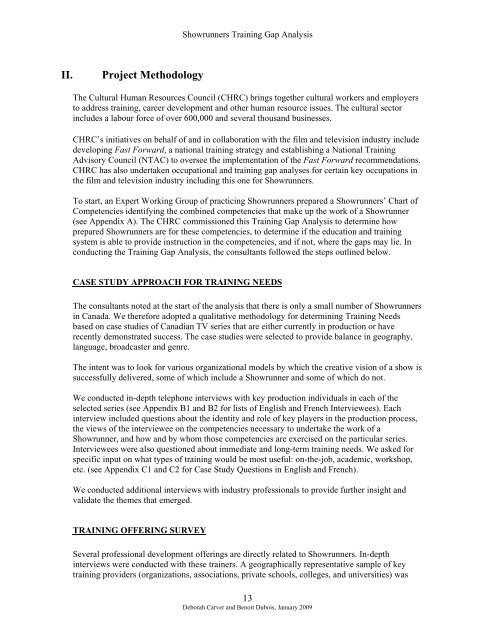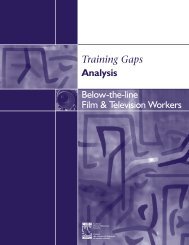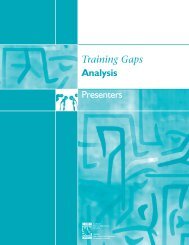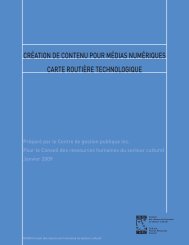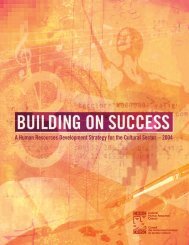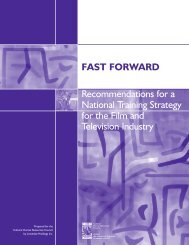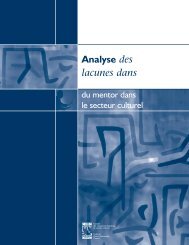Showrunners - Training Gaps Analysis - Cultural Human Resources ...
Showrunners - Training Gaps Analysis - Cultural Human Resources ...
Showrunners - Training Gaps Analysis - Cultural Human Resources ...
You also want an ePaper? Increase the reach of your titles
YUMPU automatically turns print PDFs into web optimized ePapers that Google loves.
II. Project Methodology<br />
<strong>Showrunners</strong> <strong>Training</strong> Gap <strong>Analysis</strong><br />
The <strong>Cultural</strong> <strong>Human</strong> <strong>Resources</strong> Council (CHRC) brings together cultural workers and employers<br />
to address training, career development and other human resource issues. The cultural sector<br />
includes a labour force of over 600,000 and several thousand businesses.<br />
CHRC’s initiatives on behalf of and in collaboration with the film and television industry include<br />
developing Fast Forward, a national training strategy and establishing a National <strong>Training</strong><br />
Advisory Council (NTAC) to oversee the implementation of the Fast Forward recommendations.<br />
CHRC has also undertaken occupational and training gap analyses for certain key occupations in<br />
the film and television industry including this one for <strong>Showrunners</strong>.<br />
To start, an Expert Working Group of practicing <strong>Showrunners</strong> prepared a <strong>Showrunners</strong>’ Chart of<br />
Competencies identifying the combined competencies that make up the work of a Showrunner<br />
(see Appendix A). The CHRC commissioned this <strong>Training</strong> Gap <strong>Analysis</strong> to determine how<br />
prepared <strong>Showrunners</strong> are for these competencies, to determine if the education and training<br />
system is able to provide instruction in the competencies, and if not, where the gaps may lie. In<br />
conducting the <strong>Training</strong> Gap <strong>Analysis</strong>, the consultants followed the steps outlined below.<br />
CASE STUDY APPROACH FOR TRAINING NEEDS<br />
The consultants noted at the start of the analysis that there is only a small number of <strong>Showrunners</strong><br />
in Canada. We therefore adopted a qualitative methodology for determining <strong>Training</strong> Needs<br />
based on case studies of Canadian TV series that are either currently in production or have<br />
recently demonstrated success. The case studies were selected to provide balance in geography,<br />
language, broadcaster and genre.<br />
The intent was to look for various organizational models by which the creative vision of a show is<br />
successfully delivered, some of which include a Showrunner and some of which do not.<br />
We conducted in-depth telephone interviews with key production individuals in each of the<br />
selected series (see Appendix B1 and B2 for lists of English and French Interviewees). Each<br />
interview included questions about the identity and role of key players in the production process,<br />
the views of the interviewee on the competencies necessary to undertake the work of a<br />
Showrunner, and how and by whom those competencies are exercised on the particular series.<br />
Interviewees were also questioned about immediate and long-term training needs. We asked for<br />
specific input on what types of training would be most useful: on-the-job, academic, workshop,<br />
etc. (see Appendix C1 and C2 for Case Study Questions in English and French).<br />
We conducted additional interviews with industry professionals to provide further insight and<br />
validate the themes that emerged.<br />
TRAINING OFFERING SURVEY<br />
Several professional development offerings are directly related to <strong>Showrunners</strong>. In-depth<br />
interviews were conducted with these trainers. A geographically representative sample of key<br />
training providers (organizations, associations, private schools, colleges, and universities) was<br />
13<br />
Deborah Carver and Benoit Dubois, January 2009


